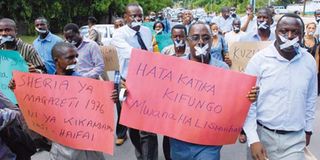Is govt really trying to stop scrutiny?

Journalists protest in Dar es Salaam. The media landscape in Tanzania has changed rapidly from having an extreme, government-controlled scarcity of public voices to having an abundance of media, both public and private. But analysts say government needs to repel draconian laws muzzling press freedom. PHOTO|FILE
What you need to know:
- In 2011, Tanzania was also among the eight countries that entered into an agreement in New York, on the Open Government Partnership (OGP). It aims at urging openness, and promoting good governance.
Dar es Salaam. The government has signed various international agreements that directly or indirectly touch on press freedom. These include the 1948 Paris Universal Declaration of Human Rights (UDHR), International Covenant on Civil and Political Rights, and the African Charter on Human and Peoples’ Rights.
In 2011, Tanzania was also among the eight countries that entered into an agreement in New York, on the Open Government Partnership (OGP). It aims at urging openness, and promoting good governance.
On paper, these agreements have played a major role in creating the image of a ‘perfect’ Tanzania where “openness” and respect for human rights are the order of the day. Yet the government, current or past, has many times been found wanting on the ground – especially when it comes to its love-hate relationship with the media.
Newspapers Act 1976
For years, the Newspapers Act 1976, for instance, has been largely used to punish media organisations that the government deemed ‘errant’. The law, described as draconian by many critics, give the information minister powers to ban a newspaper for publishing what in the eyes of the authorities is falsehood.
Chapter 22, Section 25 (1) of the Act states that: “Where the Minister is of the opinion that it is in the public interest or in the interest of peace and good order so to do, he may, by order in the Gazette, direct that the newspaper named in the order shall cease publication as from the date (hereinafter referred to as ‘’the effective date’’) specified in the order.”
While some agree with the need to protect public interests and national security from falsehoods, and abuse of media freedom, many are still of the opinion that the Act has been used to muzzle the press to avoid media scrutiny.
University of Dar es Salaam (UDSM) lecturer, Mr Richard Mbunda, says the media mostly suffers at the hands of politicians seeking to protect their own interests, and not necessarily national interests.
“Experience shows that politicians the world over will try to incapacitate or weaken the media that does not serve their interest, the ultimate aim being to protect themselves,” he says.
Just this week, the government banned a weekly local newspaper Mseto for three years on grounds that it breached the Newspapers Act. Information minister Nape Nnauye accused the newspaper of having a “tendency of reporting irresponsibly”. He said the tabloid had been “warned several times for the last five years.”
“The newspaper was cautioned to stop publishing false, misleading and seditious stories,” he was quoted in the media as saying. The minister said the newspaper had published a story with falsehoods that claimed that a senior government official had implicated President John Magufuli in corruption during elections.
He accused the paper of tampering with a document from the State Mining Corporation to justify the story, and when asked to produce the original document, failed to do so. The ban comes as the dust is yet to settle on the controversial decision by the government to limit the live coverage of Parliamentary proceedings.
Protests and boycotts
The previous budget session ended with protests and boycotts by members of the Opposition – partly sparked by the decision to limit live coverage. And in the past, the government has also banned numerous newspapers said to have breached the law – some of the decisions were dismissed as unlawful by critics accusing the government of paying lip service on guaranteeing press freedom.
In 2012, the government banned indefinitely the weekly Mwanahalisi, accusing the paper of publishing seditious articles. The ministry claimed that MwanaHalisi’s had published articles that contained seditious and false material.
The Committee to Protect Journalists (CPJ) described the decision as unlawful and abuse of the Newspaper Act to muzzle the press.
“Once again, Tanzanian authorities have wielded an archaic newspaper act and vague, unsupported accusations of sedition to censor reporting that is merely critical of the government,” said CPJ East Africa Consultant Tom Rhodes.
The indefinite ban was lifted by the High Court in September last year. It was noted that in banning the newspaper, the then Information minister, Dr Fenella Mukangara had breached procedures as the newspaper was not given the right to be heard before it was banned.
In September 2013, the government banned the production of Mwananchi and Mtanzania newspapers for two weeks and three months, respectively.
The then director of Information Department, Assa Mwambene, alleged that the two newspapers published seditious stories that could provoke discontent between the government and public.
The New York-based Committee to Protect Journalists condemned the banning of the two newspapers accusing the government of relying on “an arsenal of anti-media laws such as the 1976 Newspaper Act”. In January last year, the EastAfrican newspaper was also banned from circulation on grounds that it had been circulating in the country without proper registration, contrary to section 6 of the Newspaper Act number 3 of 1976.”
The order came days after Mr Mwambene raised issues with a cartoon that criticised the then President Jakaya Kikwete on his fight against corruption and an opinion that criticised Tanzania’s stance against UN-backed force to take on the FDRL rebels in the Democratic Republic Congo (DRC).
The paper was back in circulation after a year out of the market.




